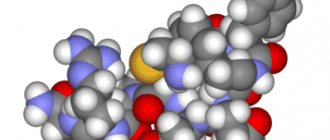Symptoms of delayed periods in girls
Symptoms of a 14-year-old girl not having periods include the natural, most obvious absence of bleeding at the scheduled time. Although at such a young age the cycle has not yet fully formed, its approximate duration can be calculated in order to determine the time frame when menstruation should begin. As you know, approximately 7-14 days before your period, menstrual symptoms appear, which become a kind of wake-up call that you will soon need to be much more careful about your hygiene. There are many such symptoms, and if they are absent in a girl at 14 years old, then this may also indicate a delay in menstruation. The most obvious include:
- frequent headaches, dizziness;
- painful sensations in the mammary glands;
- sudden mood swings, most often negative: touchiness, irritability, moodiness and tearfulness. There are also sudden outbursts of anger;
- increased appetite, rapid weight gain. Changes in taste preferences, craving for salty or sweet;
- skin rashes, acne on the face and back;
- frequent nausea and vomiting;
- aching pain in the lower back and lower abdomen;
- sudden changes in sexual desire.
Symptoms do not appear all at once in one girl; more often the arrival of menstruation is accompanied by mood swings and an increase in appetite, other signals are more individual. And if they have been absent for a long time, then this indicates a delay in puberty, as a result of which menstruation stopped at the age of 14.
https://youtu.be/sGC5vlnjyfo
Reasons for the failure of the menstrual cycle in girls 15 years old
Many reasons can cause disruptions in the cycle:
- Excess weight. If you are overweight, you may experience problems such as: oligomenorrhea - rare menstruation, amenorrhea - absence of menstrual periods. Excess weight can cause hormonal problems in a teenager, leading to early puberty.
- Body weight deficiency. Sudden weight loss can cause problems with the cycle, since hormones of the reproductive system are produced in small quantities. This leads to irregular periods or no periods. In severe cases, for example, with anorexia, the cycle cannot be restored.
- Malfunctions of the endocrine system (diabetes mellitus, thyroid problems). As a rule, after treatment the cycle normalizes.
- Previous illnesses. Any disease is stress for the body. Even a cold can cause a slight delay in your period. As soon as the body recovers, the cycle will improve.
- Congenital pathologies of the genital organs, for example: bending of the uterus, aplasia (absence of the uterus).
- Hormonal disorders. Symptoms are: acne (pimples), excessive sweating, growth disorders, hirsutism (excessive hair growth), lack of breast development.
- Inflammatory diseases of the genitourinary system. You should not delay treatment, as they can become chronic and even lead to infertility.
- Increased physical activity. This is the most common cause of menstrual problems in girls. Heavy workload at school, classes in clubs and with tutors, excessive sports - all this leads to disruptions in the young body.
- Psychological experiences. During the difficult teenage period, problems may arise at home, at school, and with friends. During this stressful period, a child needs attention and support from his parents. Menstruation will improve after eliminating the cause of stress.
- Early onset of sexual activity. This factor negatively affects the formation of the reproductive system. In addition, there is always a risk of pregnancy. It is necessary to talk with your child about contraception and sex education.
- Climate change. A trip to the sea or moving to a new place can cause menstrual irregularities. After acclimatization, everything will return to normal.
- Bad habits such as drinking alcohol or drugs. This can affect the body's condition and cause a delay in the menstrual cycle.
Reasons for missed periods at 14 years old
There are many reasons why there are no periods at the age of 14, and not all of them require medicinal intervention to the problem. A failure in the cycle can occur due to the following factors:
- Constant stress, nervous breakdowns.
- Poor nutrition, sudden weight changes.
- Lack of physical activity or, conversely, too much of it.
- Metabolic disorders, hormonal imbalances.
- Hereditary diseases of the reproductive system.
All these reasons can be eliminated on your own, without the help of a doctor. For example, the problem of poor nutrition can be solved by the following methods:
- increasing the amount of lean meat and fish in the diet;
- giving up crackers and chips. If you really want to, you can make them at home - it will be tastier and less harmful to the teenager’s body;
- transition to eating at intervals of 2–3 hours between meals. This time is enough for the body to digest what is in the stomach;
- reducing food portions;
- taking various vitamin complexes;
- eating seasonal fresh vegetables and fruits;
- It is worth considering that the temperature of hot dishes should not be higher than 55 degrees, and cold dishes should have a temperature of no lower than 15 degrees.
In this way, you can not only help your body, but also keep your figure in shape, because following the described recommendations does not lead to excess fat formation. However, if the girl is eating normally, then there is a reason to consult a doctor and have her blood tested to check if there are problems with her glucose balance. In general, if there are problems, it is recommended to take monthly blood tests to make it easier to control sugar and hemoglobin in the body.
Physical activity is a wonderful thing for a young body, helping to strengthen bones and muscles and keep oneself in good shape. However, at the age of 14, girls are impressionable and begin to worry about their appearance, and in order to be more athletic and fit, they abuse physical activity. At this age, it is better not to allow this to happen and simple exercises such as exercise or a short jog will be quite enough. A teenager already receives a “loading dose” of loads in physical education lessons at school.
Hormonal imbalances are also a common occurrence in teenage girls; they are often caused by genetics or diseases of the endocrine system. In order to prevent severe hormonal imbalance, it is necessary to undergo examination by a doctor every month if the girl has a certain predisposition.
In addition, it is important to take into account the emotional component of a teenager’s life. At this age, youthful maximalism is often found, and problems at school or family can lead to severe stress, anxiety and conflicts. However, a teenager’s emotions are influenced not only by other people, but also by their daily routine: lack of sleep, poor nutrition, and severe overwork have a detrimental effect on the girl’s mood and often lead to increased irritability and moodiness.
Period of menstruation is normal
Puberty occurs from the age of nine years and ends with adulthood. The initial signs are hair growth in the groin area and under the arms, intense breast enlargement, and the formation of a subcutaneous fat layer.
After this, the girls begin to have their first discharge. Blood frightens a teenager; the parents’ approach is important here. Mom should talk to her daughter about changes in the body, and also suggest the right actions.
Questions regarding the late onset or delay of a girl’s period should be discussed with a gynecologist.
Parents often wonder why they don’t have periods at 13 years old. Teenagers have missed periods quite often, and this is an indicator of the norm. Don't worry too much if they didn't start at age 12 or thirteen.
Although deviations in time do not indicate the development of a pathological process, it cannot be excluded. This fact is not recommended to be ignored. At the first suspicious symptoms, you should consult a doctor.
Irregular menstruation cycles in girls occur for various reasons. Some are easy to eliminate on your own, while others require only medical intervention.
It is worth noting that during adolescence, ovulation does not occur every cycle. It also affects the regularity of menstruation.
Some girls become apathetic during this period
Delays are always accompanied by additional manifestations. In most cases, it is the psycho-emotional sphere that suffers. The following symptoms are considered the most common:
- increased irritability;
- moodiness;
- apathy;
- lethargy;
- frequent mood changes;
- lack of appetite;
- decreased performance;
- tearfulness.
Menstrual irregularities are closely related to the emotional state. Stress at school and in extracurricular activities, worries about the opposite sex, conflicts with parents and peers lead to stressful situations. The teenage body reacts sharply to such changes and turns on its protective function. This may cause a delay in menstruation.
Try to get plenty of rest, sleep at least 8-10 hours a day, and at least 6 hours should be allocated for night sleep.
Menstrual cycle in teenagers
It is worth noting that the appearance of menstruation in adolescents is not necessary from the age of 13; in some girls, maturation occurs as early as 11 years, while others can wait until they are 16. In addition, the cycle may be unstable for the first 2–3 years, and when menstruation is delayed, this may indicate a natural restructuring of the body.
It is important that this delay is not accompanied by other unpleasant factors or hereditary problems associated with the genitals. If the delay does not exceed 2 weeks, then, in principle, there is no reason to panic.
In adolescence, it is also difficult to calculate how long your period lasts, for the same reasons why your cycle fluctuates. By the way, the causes of these fluctuations may also be an unstable emotional state associated with problems at school or family.
Features of sexual development of girls
Puberty (or puberty) is the process during which physical and behavioral changes occur that shape a girl into a woman ready to assume her social and biological role of reproduction.
It usually begins by the age of 8-10 with enlargement of the mammary glands. Over the next 2-2.5 years, other secondary sexual characteristics begin to appear and develop:
- pubic hair grows;
- the external and internal genital organs (labia majora and minora, uterus) increase in size;
- Increased fat deposition in the lower abdomen and thighs.
The culminating moment of puberty is menarche. Or the onset of the first menstruation. It is considered normal for menstruation to come between the ages of 11.5 and 14 years.
At first, the menstrual cycle is irregular, the duration of both the periods themselves and the entire cycle is very variable, sometimes there can be delays of up to a week or more. Menstruation itself can be abundant or scanty; no one can clearly say how long a girl’s periods last for 14 years if menarche has occurred recently. This is due to the not yet established production of female sex hormones. After 2 years, many girls’ menstrual cycle stabilizes; 5 years after menarche, 90% of girls have a fully formed cycle and are ready to conceive.
When should 14 year old girls menstruate?
As we have already mentioned, the average age of puberty begins at 13 years old, but there are cases when menstruation begins at 11. Age is also determined by a hereditary factor: if there is a girl in the family, the closest generational relatives - mothers and grandmothers - have periods started later than 14 years of age, then it makes no sense for a teenager to expect them earlier.
The first signs of menstruation in girls begin to appear three years after breasts begin to grow. In this case, it is logical to believe that if by the age of 13 a teenager’s mammary glands have just begun to enlarge, menstruation will not appear in the same year.
Features of puberty in girls
In the teenage body, physiological changes in hormonal levels are observed, so for this category of “women” a delay of 10 days in menstruation is not a global problem. It takes time for hormonal levels to establish, and by the age of 14–15, a teenage girl has a regular menstrual cycle. Further deviation indicates a problem, and it is important to visit a medical center.
One way or another, a delay in monthly menstruation requires high-quality diagnosis. The fact of pregnancy (during sexual activity) and diseases of the reproductive system should not be ruled out. A genetic predisposition is also relevant, when instability of the menstrual cycle is transmitted from mother to mature daughter. In any case, a visit to the doctor will not be in vain.
Puberty in girls occurs between the ages of 8 and 18 years. The first signs of puberty are manifested by hair growth in the axillary and pubic area, an increase in the mammary glands and the volume of adipose tissue. If the mother notices these signs, it means that her daughter will begin menstruation in the next 1.5 - 2 years.
Menarche often occurs between 11 and 14 years of age. Sometimes menstruation begins earlier, for example, at 9–10 years, or later, at 15–16 years. Deviation from the norm does not always indicate pathology, but this fact should not go unnoticed by parents and doctors.
Girls who are prone to obesity and are physically developed experience early menarche. In thin teenagers, the first bleeding does not occur until the age of 12.
The process of puberty is purely individual and genetically determined. If the mother herself saw her first period at 12–13 years old, her child will begin bleeding around the same period. However, due to the rapid maturation of modern youth, teenagers now have their periods much earlier than in previous generations. The difference today is 1 year.
The regularity of menstruation in a girl aged 12–14 years depends on the proper functioning of the pituitary gland and hypothalamus. Improper functioning of these parts of the brain becomes the main cause of delay in adolescence.
When should you contact a gynecologist?
Many natural and easily correctable factors do not mean that the delay cannot have serious causes that require treatment. Also, the delay may have the following symptoms that indicate the need to go to the gynecologist:
- Complete absence of any signs of puberty. For example, a girl does not grow hair in her armpits and pubic area.
- If by the age of 14 the breasts have not begun to grow, then this is also a reason to consult a doctor, as it indicates a severe delay in the onset of puberty.
- Long-term (more than a month) absence of menstrual symptoms, as well as unhealthy vaginal discharge that is not related to menstruation.
The state of the reproductive system largely depends on hereditary factors, so if a mother knows that her diseases could be passed on to her daughter, then it is necessary to visit a doctor every month and undergo an examination.
What to do if the doctor said there were serious problems that caused the delay? The most important thing is not to self-medicate, but strictly follow the recommendations of a specialist and follow the instructions.
When the cycle returns to normal
Parents, starting from 8-9 years old, should be very attentive to their daughter, if over the years there are no changes in her appearance according to the female type, and her behavior is dominated by anger and aggression or, conversely, complete apathy, in such cases it is necessary to seek help to a gynecologist and endocrinologist.
If a girl’s first menstruation has already passed, and the second is delayed by 1-1.5 months, this is normal, and there is no need to worry too much about this, but if there is no second menstruation for more than six months or the duration of the discharge varies widely (1 cycle lasts a week , and in another it does not reach 3 days), you should immediately consult a doctor.
If a girl under 14 years of age has not developed secondary sexual characteristics (body hair does not grow, breasts do not enlarge, there is no menstruation), the teenager is diagnosed with amenorrhea. The same pathology is diagnosed when a girl has all the signs of puberty, and her critical days have never come at the age of 16.
In medical practice, it is not customary to establish certain standards for the duration and regularity of the cycle for adolescence, but most often the menstrual cycle is normalized a maximum of 2 years after menarche. If your period is delayed by up to 45 days during the first two years of your cycle, there is no need to panic, but a medical consultation in this case will not hurt.
Opinion of gynecologists
Doctors recommend not to neglect your health and always listen to its signals. Even if a girl’s irregular periods are a fairly natural phenomenon, this is not a reason to ignore the delay and leave everything to chance. In any case, at the moment when a girl begins to notice signs of puberty, regular consultation with doctors, including a gynecologist, is necessary. This will help not only monitor the teenager’s health, but also prevent possible diseases. Constant monitoring, regulating hormone levels, monitoring blood sugar and hemoglobin levels will ensure good health for the girl and significantly improve her future life.
If diseases of the reproductive system are not detected in the early stages, then with age the situation will only worsen, and some problems lead to infertility.
Causes of primary amenorrhea with delayed sexual development
This diagnosis is given to girls who, by the age of fourteen, have no signs of puberty and have not appeared at menarche. The reasons for the delay of menstruation in adolescents and the inhibition of the body’s development may be different.
Gonadal malformations
The absence of menstruation in a girl aged 14 or 15 is often due to malformations of the gonads, namely:
- Swyer's syndrome;
- gonadal dysgenesis;
- testicular feminization syndrome.
Amenorrhea in this case is caused by chromosomal changes, as a result of which underdevelopment of the gonads is observed.
In a third of girls suffering from primary amenorrhea with mental retardation, developmental inhibition is caused by gonadal dysgenesis, in which the tissue necessary for the normal functioning of hormones is absent.
This pathology can occur in several forms:
- mixed;
- erased;
- typical;
- clean.
In this case, such defects as atrophy of the mucous membranes of the vulva and vagina, genital infantilism and underdevelopment of the mammary glands are observed.
Malformations in the central nervous system circuit
Developmental delay and absence of menstruation in a 15-year-old teenager can be caused by developmental defects in the central nervous system affecting the pituitary gland, such as:
- tumors;
- vascular thrombosis or tissue necrosis;
- damage to the pituitary stalk.
As a result of this, the ovaries are not able to produce the required amount of estrogens - and critical days do not come.
Results
It is also important to take into account that in a situation where a girl has already had a fairly long delay in puberty, there could be other reasons for this. A teenager may take longer to “mature” due to a number of the following factors:
- Smoking. As you know, many teenagers consider cigarettes to be something pretentious and fashionable, so they start trying them at an early age. It’s good if the child realized that he didn’t like it and stopped smoking, but according to statistics, even if the teenager didn’t enjoy smoking, he continues to do it for reasons of fashion, and doesn’t want to fall on his face in front of his peers, who, in his opinion, They will consider him a weakling.
- Frequent colds. Viral diseases weaken the teenager’s body and such general weakness also leads to delays.
In general, it is recommended to monitor the general condition of the teenager’s body and try to establish a trusting relationship with the child so that he does not hesitate to talk about his problems. Although the instability of menstruation is due to age, and menstruation is “adjusted” at least during the first year and a half, it would still be a good idea to consult a doctor.
Menstruation and hormones
In both adult women and teenage girls, two hormones are directly responsible for the regular menstrual cycle - estrogen and progesterone. Working in pairs and complementing each other, they are responsible for the girl’s well-being and attractive appearance.
If the hormonal balance is disturbed in the female body, the menstrual cycle is therefore disturbed. Since the normal timely maturation of the follicle in the ovaries does not occur, this leads to the appearance of anovulatory cycles when ovulation is absent.
Due to hormonal imbalance, the female body acquires many characteristics of a male one.
That's why some girls have:
- rough voice;
- excess body hair;
- masculine figure, etc.
If you have such signs of hormonal imbalance, you should consult a doctor, since these are the most common reasons why it is difficult for a girl to become pregnant and carry a child to term. At a young age, there is still enough time to correct hormonal levels with the help of competent treatment.









